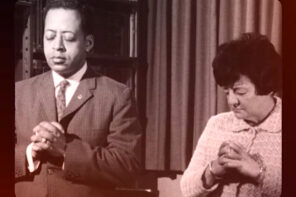Marianne Williamson had me at hello. That jumble of first impressions—her reined-in frustration (I’d forgotten to tell her where my classroom was) fading into an I-found-you relief followed by resolute eye contact, a strong handshake and a flash of acceptance—yes, it seemed to say, we are in this together—snapped decades of my inchoate antagonism toward the one of the baby boomers’ most celebrated gurus.
Anyone not under a rock for the past 20 years knows who Williamson is. Since the 1980s, she has taught A Course in Miracles (ACIM), a how-to primer on self awareness and spiritual growth that psychologist Helen Schucman claimed to have received via divine dictation between 1965 and 1972. During the 1980s, Williamson was one among thousands of spiritual seekers studying the workbook, but her lectures brought the material to a wide audience.
When A Return to Love, Williamson’s interpretation of ACIM, was published in 1992, the book topped national bestseller lists and propelled Williamson to media stardom. Smart, attractive and sporting a “been-there, done that” backstory (druggie, divorcée, single mother, cabaret singer), the little Jewish girl from Houston, Texas was profiled by everyone from Psychology Today to the New York Times.
Some stories zeroed in on Williamson’s celebrity connections (BFFs with Oprah Winfrey and David Geffen, officiating at one of Liz Taylor’s weddings) while others sniggered at her “New Age teachings.” But few mentioned the social activism that had been a continuous thread through her career. That activism—from the 1989 founding of Project Angel Food, which provided meals to people with AIDs to the 2012 launch of Sister Giant, an initiative supporting women’s engagement in electoral politics—culminated in her announcement last fall that she would run for the California’s 33rd District Congressional seat.
Williamson’s visit to my USC class on American spirituality was a boon for me, but it also served her purposes. District 33 cuts through some of the state’s wealthiest communities including Malibu, Beverly Hills and Palos Verdes, and Williamson would be speaking here to potential voters if not volunteers.
Meanwhile, I’d have a 21st century incarnation of the 19th century New Thought and Theosophy teachers we’d studied in class. After a month of discussing how metaphysical movements were pathways to female empowerment and social reform, Williamson would show what that looked like today.
But neither of us got what we expected.
Instead I heard a candidate raise the issues that worry me: economic inequity, climate change, rocketing incarceration rates, domestic surveillance and a permanent war economy. She explained that she is running as an independent because both Democrats and Republicans are so beholden to corporate funders that neither can instigate genuine reform. She believes that most Americans are disgusted by Washington’s obeisance to big business and expects they will start electing independents to get the country back on track.
Yet as important as these issues are, Williamson’s appeal is not based on what she wants to do but on why she is doing it. Since the 1970s, she said, the American left has abandoned the spiritual impulse that fueled movements for abolition, labor reform, women’s rights, civil rights and pacifism. For Williamson the spiritual impulse, the “self-actualization of the individual,” leads to a life of love and a beloved community embodied by a society that seeks the best for its citizens and their planet.
As she spoke I found I couldn’t argue with her portrait of a left that has closed its ears to arguments about love’s transformative power and the immanent transcendence that betokens its presence. We—especially those in academia and the media—have written off religion as divisive, outmoded and irrelevant just as we have trivialized spirituality as frivolous self-indulgence. As a result, our politics are soulless and our candidates’ calls for hope fail to translate into change.
Writing in Slate last week, Dahlia Lithwick made a similar observation. After attending a Moral Monday rally in Raleigh, she noted that “ceding all talk of faith and morality to the political right in this country has been disastrous for the left.”
Yet it’s not just the left that’s at fault. For several decades, the legacy media has conflated news about American religion with news about the Religious Right. And even when the media does write about religious moderates, it’s usually on denominational in-fighting over key issues on the right’s agenda (gay marriage, ordination of women and gays, and abortion). The disparity between what’s deemed newsworthy and what’s not would be comical, if it weren’t for the news media’s key role in framing public discourse. Why is it business-as-usual that Fred Phelps and a handful of anti-gay Westboro Baptist demonstrators receive widespread coverage while 80,000 protesters against North Carolina’s tax hikes for its poorest citizens amidst cuts to its education and healthcare budgets barely register in the nation’s news outlets.
Simply put: religion news is dominated by the shudder-worthy antics of the extreme right while successful organizing by religious moderates, and political campaigns by spiritual activists, are mocked or ignored.
Williamson is well aware of the problem, “[The media] use the term ‘New Age guru’ to marginalize or trivialize,” she told the class. “But I never thought that people who heard me talk or read my work thought I was woo-woo.”
Williamson may have thought she had a sympathetic audience among the students, but she failed to rouse their enthusiasm. Dilatory questioners asked about her connection to Judaism, her spiritual practices, and her take on metaphysical religion. Few seem ignited about her fusion of spirituality and politics much less her campaign for Congress. When I ended the class after a very long 80 minutes, she seemed troubled by their unresponsiveness.
Maybe they were tired, I said. Perhaps they were intimidated. I did not say they may have been turned off by campaign riffs that worked for supporters but not the uninitiated. Those had not bothered me. I was too caught up by my own epiphany: I’d bought the media line. I, a leftist who studied religion, had spent 20 years thinking the worst of a woman—she was out for money, played on her sexuality, exploited the lost—because she believed something different from what I did.
Marianne Williamson may have had me at hello, but she hooked me with her description of spiritual politics and her belief that the left can still be saved.




